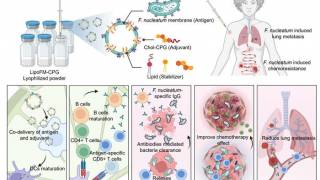Glioblastoma Vaccine Shows Positive Phase Ib Study Results

The results from a phase 1b clinical trial of a new experimental glioblastoma vaccine show that patients tolerated the treatment well, slowed tumor recurrence, and prolonged patient survival.
These researchers treated 33 patients between September 2015 and March 2018 with newly diagnosed glioblastoma multiforme with the novel cancer vaccine candidate IGV-001.
The vaccine is created from the patient tumor cells sampled during the surgical removal of the primary brain tumor.
Researchers first take the cancer cells, treat them with an antisense oligodeoxynucleotide (AS-ODN) against IGF-R1, a receptor shown to drive tumor growth and metastasis, and load them with additional AS-ODN into diffusion chambers.
Then, the dime-sized chambers and contents are irradiated and implanted under the skin of the patient's abdomen.
The phase 1b trial only enrolled patients who were scheduled to have surgery before the start of standard-of-care adjuvant therapy.
The results showed that patients who received the Imvax glioblastoma vaccine had more prolonged progression-free survival and overall survival - two standard measures of cancer treatment success - than the control group.
The researchers saw no vaccine-related adverse events.
The median prognosis, or overall survival, for patients treated with the highest dose of the vaccine was 21.9 months, compared to 14.6 months for standard of care.
Median progression-free survival was 10.4 months for the highest dose vaccine, significantly higher than the 6.9 and 5.4 months in the published standard of care studies.
This research was presented at the annual American Association for Cancer Research meeting on March 31st in Atlanta, Georgia.
David Andrews, MD, Professor of Neurosurgery at the Vickie & Jack Farber Institute for Neuroscience -- Jefferson Health and co-founder, Chief Medical Officer, and interim Chief Executive Officer of Imvax, said in a press release, "We look forward to initiating a phase II trial later this year to confirm these phase 1b results."
"A consequence of the combined effects of the IGF-1R antisense and irradiation, our evidence shows that the chambered tumor cells release antigens, which, together with the immunomodulatory AS-ODN, diffuse out of the chamber into the patient's body and activate the immune system against brain tumor cells," says immunologist D. Craig Hooper, PhD, a Professor of Cancer Biology at the Sidney Kimmel Cancer Center - Jefferson Health and a co-founder and Chief Scientific Officer of Imvax.
The phase 1b clinical trial builds on earlier work showing that standard-of-care treatment for glioblastoma damages the immune system and suggesting that the vaccine would be more effective in patients whose immune systems had not been compromised by prior therapy.
IGV-001 has been granted orphan drug designation for treating malignant gliomas by the U.S. Food and Drug Administration and the European Medicines Agency.
Glioblastoma is the most aggressive type of primary brain cancer, one with a prognosis of 11-15 months with standard treatment. It affects fewer than 200,000 people in the U.S.
Glioblastomas (GBM) are malignant Grade IV tumors where tumor cells reproduce and divide at any given time. GBM is one of the most malignant types of central nervous system tumors. Despite advances in treatment modalities, it remains largely incurable.
A much more comprehensive list of 72 recent brain tumor statistics was written by Aaron Cohen-Gadol, MD, Founder and President of Atlas Meditech and Neurosurgical Atlas. Understanding brain tumors is key to advancing public health, as prevention starts on an individual basis by being informed of the risks and signs of this dangerous illness.
Notes: This article was updated on Feb. 14, 2024, including numerous content edits and comments from Aaron Cohen-Gadol, MD, and an unrelated contributor.
Our Trust Standards: Medical Advisory Committee
























